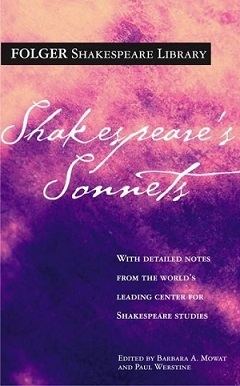What do you think?
Rate this book


391 pages, Mass Market Paperback
First published January 1, 1609

Nu-s sori ochii iubitei, nu scînteie
ro┼¤ia-i gur─ā ca m─ārgeanu-n m─āri,
de-i alb─ā neaua, s├«nul ei de ce e
posomor├ót, ┼¤i-i noapte al ei p─ār?
┼×tiu, din Damasc, albe ┼¤i ro┼¤ii roze
cu care chipul nu-i e logodit,
miresme ┼¤tiu, st├«rnind apoteoze
str─āine de al Doamnei duh smerit,
├«mi place s-o ascult, de┼¤i-i mai scump─ā
auzului, o muzic─ā, -i ┼¤tiut,
nu le-am v─āzut, zei┼Żele cum umbl─ā
dar ea, merg├«nd, p─ā┼¤e┼¤te doar pe lut.
┼×i totu┼¤i, jur pe cer, f─āptura-i rar─ā
cu nimeni ┼¤i nimic nu se compar─ā.
For we which now behold these present days,
Have eyes to wonder, but lack tongues to praise.




What is your substance, whereof are you made,
That millions of strange shadows on you tend?
Since everyone hath every one, one shade,
And you, but one, can every shadow lend.
That time of year thou mayst in me behold. Her translation is presented thus:
When yellow leaves, or none, or few, do hang
Upon those boughs which shake against the cold,
Bare ruin'd choirs, where late the sweet birds sang.
In me thou see'st the twilight of such day
As after sunset fadeth in the west,
Which by and by black night doth take away,
Death's second self, that seals up all in rest.
In me thou see'st the glowing of such fire
That on the ashes of his youth doth lie,
As the death-bed whereon it must expire,
Consum'd with that which it was nourish'd by.
This thou perceiv'st, which makes thy love more strong,
To love that well which thou must leave ere long.
┬½Tu reconnais en moi ce moment de l'ann├®eI thought the first seven lines were excellent, the rest somewhat less so, and wondered who the translator was; she doesn't say. After a little googling, I find that the initial portion is from a 1970 translation by Jean Fuzier. But who wrote the rest of it, and why has she performed this strange piece of mix-and-match without even telling us what she's done? I suppose that now I know part of the story, the quotation marks do give a clue. Should we conclude that there are in fact three translators?
O├╣ pendent aux rameaux qui tremblent dans le froid,
Ch┼ōurs nus et d├®labr├®s, quelques feuilles fan├®es,
O├╣ des oiseaux nagu├©re on entendait la voix.
En moi tu vois aussi le feu cr├®pusculaire
Qui decline ├Ā l'ouest au coucher du soleil
Et que doit emporter bient├┤t la nuit aust├©re┬╗
┬½Car le temps sans r├®pit m├©ne ├Ā l'affreux hiver,
L'├®t├®, pour l'y d├®truire, et la s├©ve se glace,
Plus de feuillages drus, la neige a recouvert
La beaut├® ; en tous lieux la sterilit├® passe┬╗
┬½Donc ne laisse l'hiver, de sa main decharn├®e
Ravager ton ├®t├® sans l'avoir distil├®e...┬╗
For never-resting time leads summer onwhile the third comes from Sonnet 6:
To hideous winter, and confounds him there;
Sap checked with frost, and lusty leaves quite gone,
Beauty o'er-snowed and bareness every where:
Then let not winter's ragged hand deface,I still haven't figured out who translated them though.
In thee thy summer, ere thou be distilled: